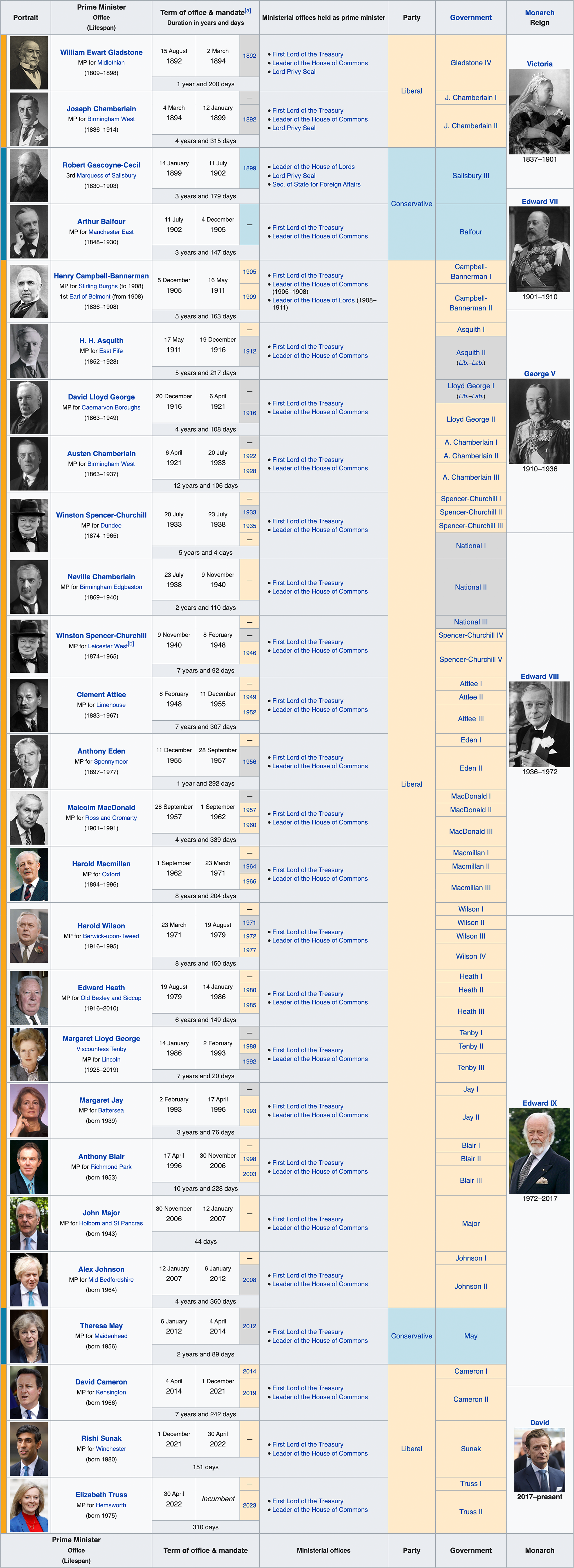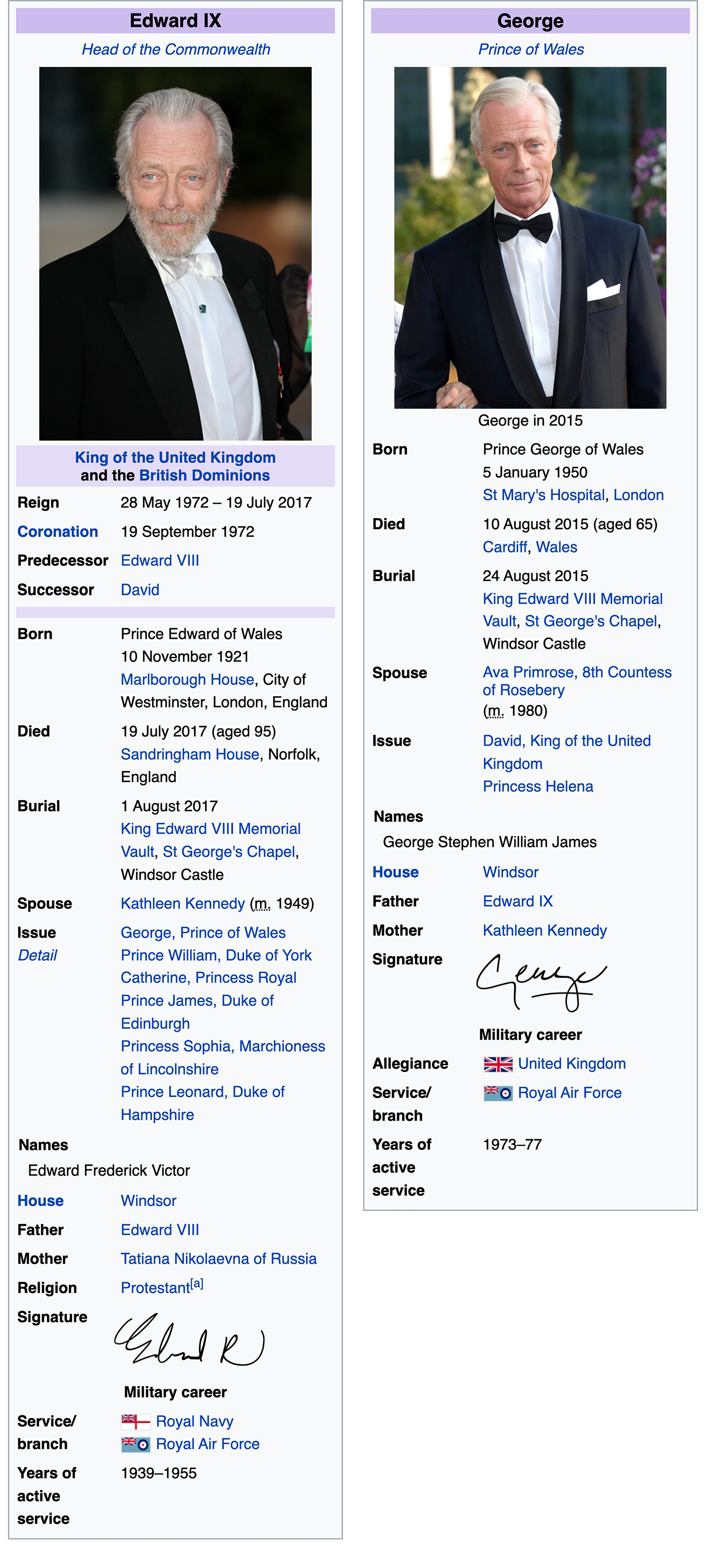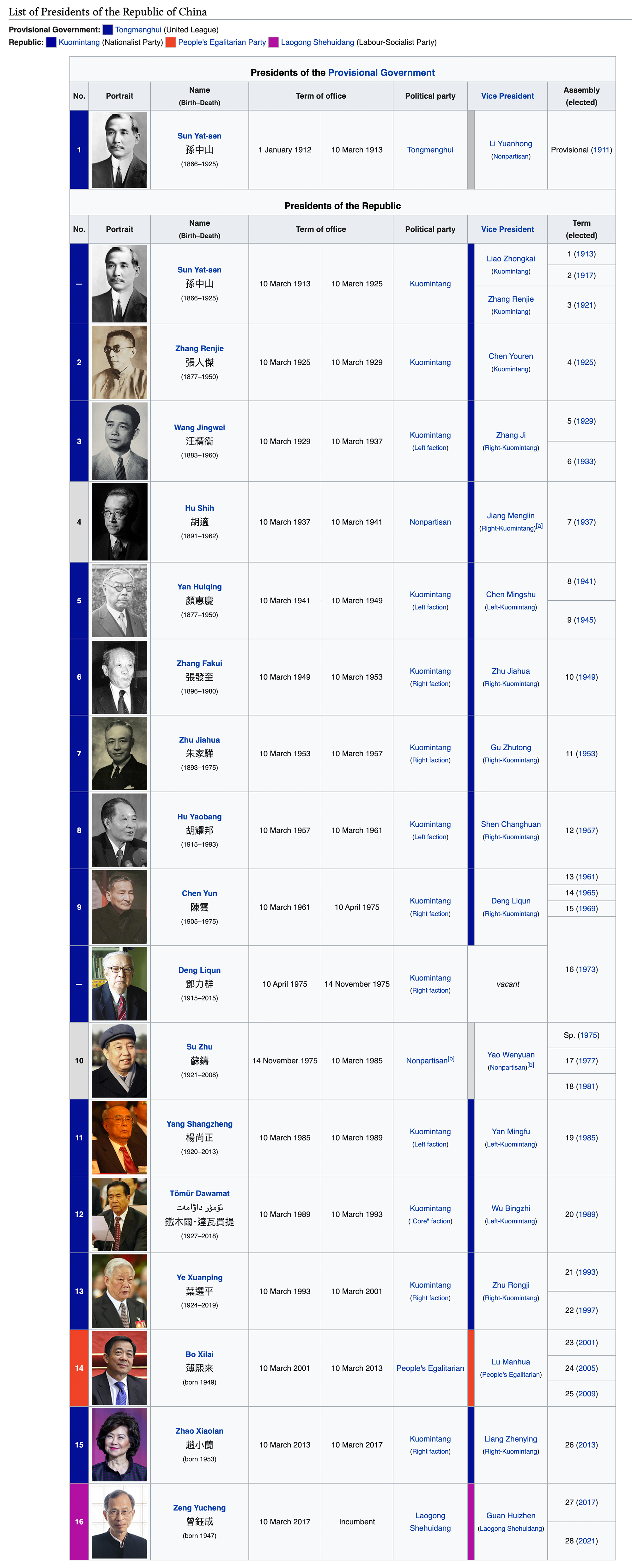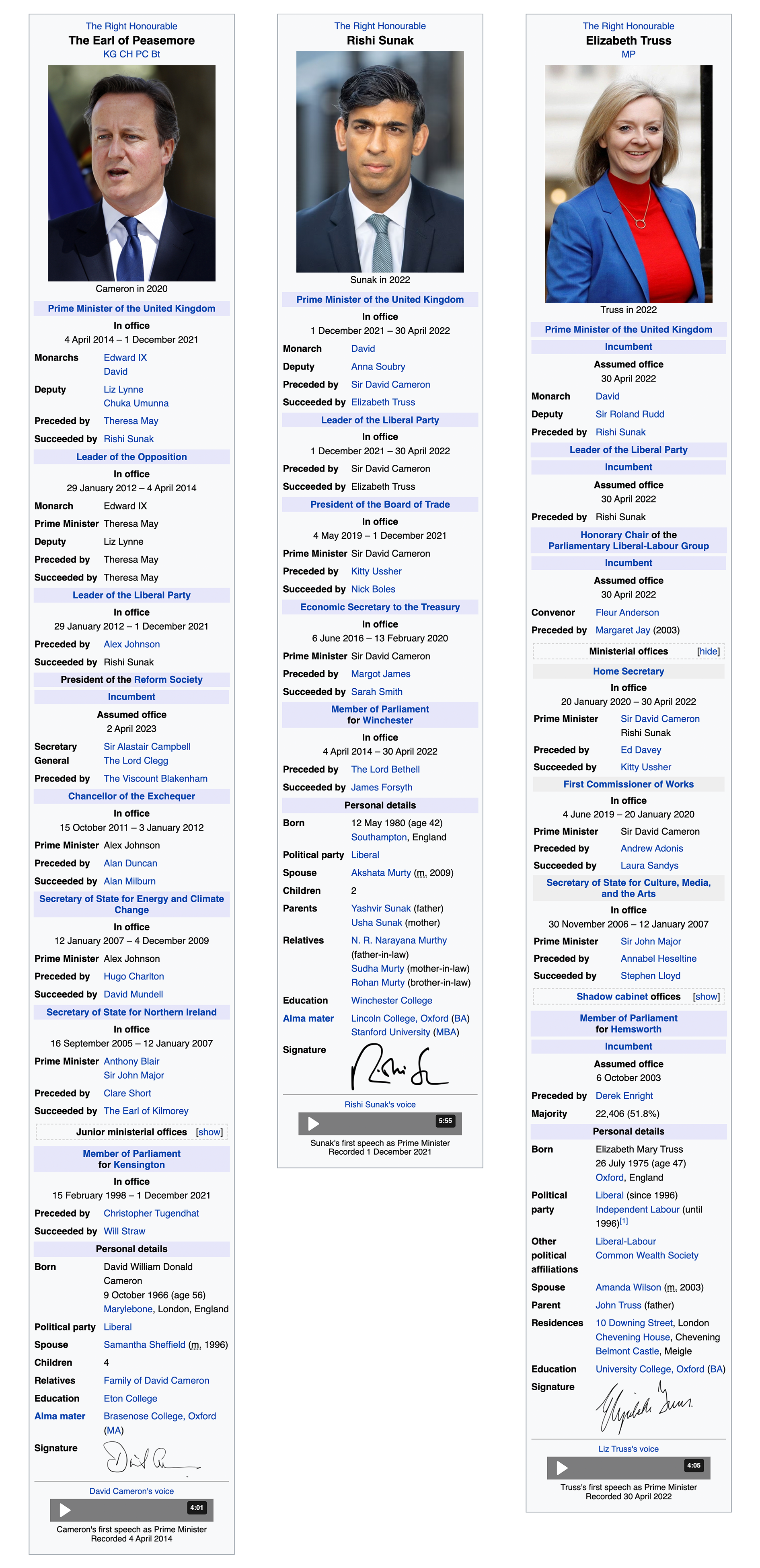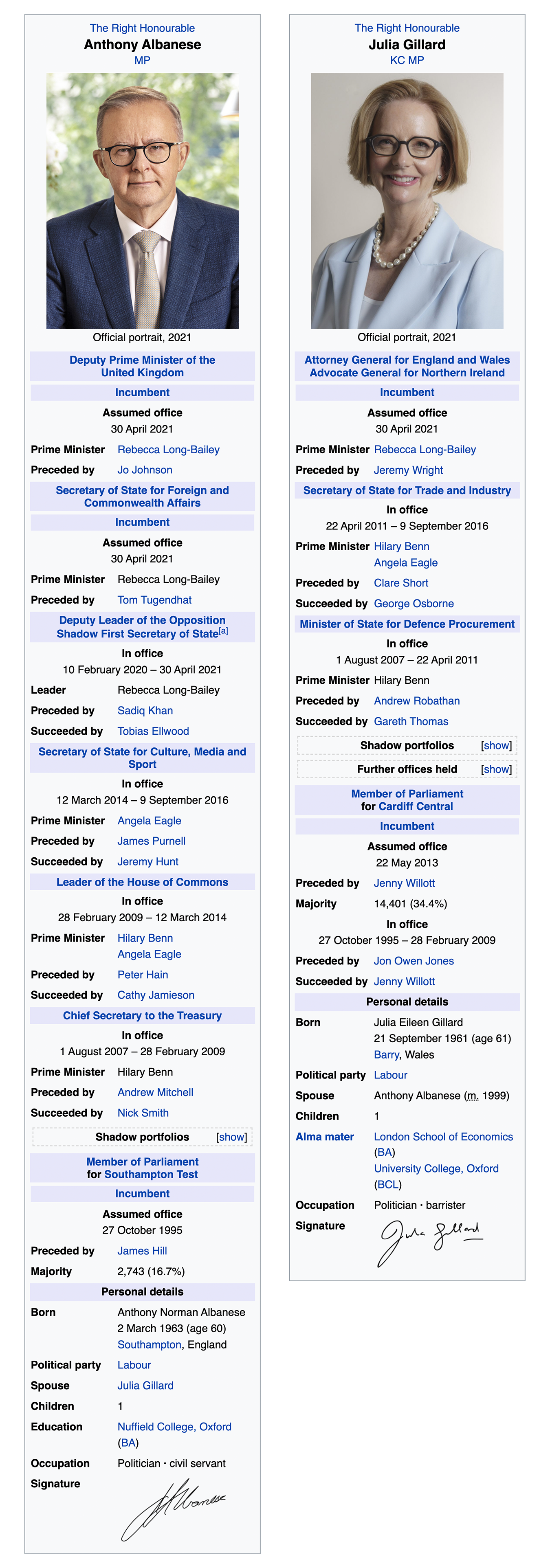-
Hi Guest!
The costs of running this forum are covered by Sea Lion Press. If you'd like to help support the company and the forum, visit patreon.com/sealionpress
You are using an out of date browser. It may not display this or other websites correctly.
You should upgrade or use an alternative browser.
You should upgrade or use an alternative browser.
aaa's bad memory palace
- Thread starter aaa
- Start date
Gladwyn Merrick
Member
Dare I ask what happened to George?
Steve Brinson
The possum is not OK. Neither are we.
- Location
- Brooklyn (originally Houston)
- Pronouns
- he/him
Should we infer that Edward IX's wife is, well, one of those Kennedys?
Up to the audience’s interpretation. Something like a heart attack, or maybe a car accident.Dare I ask what happened to George?
Yes indeed. IRL she married a British nobleman, Billy Cavendish—the son and heir of the Duke of Devonshire.Should we infer that Edward IX's wife is, well, one of those Kennedys?
Up to the audience’s interpretation. Something like a heart attack, or maybe a car accident.
Yes indeed. IRL she married a British nobleman, Billy Cavendish—the son and heir of the Duke of Devonshire.
She'll have renounced her Catholicism then?
She would, yes.She'll have renounced her Catholicism then?
The United Kingdom of Great Britain and Northern Ireland in the Year of Our Lord 2023
His Majesty The King, and his Heir
King David: The man's choice of name should be your first hint. Thrust into the role of Prince of Wales after his father's untimely death in Cardiff, the boy once known as David to all his family (and the press) was expected to take after his grandfather and become Edward X. But the old man's wishes be damned—when the new King took the throne at the age of 41, he decided to keep his name, thank you very much. David was known in his twenties as a lovable rogue, spending long days with artists, models, and actors on his school holidays. Instead of joining the Forces after graduating from university, as his father and uncles had done, he went right back to Oxford and started his MPhil. The new King was a sea change in the monarchy's public persona after the dignified but rather stiff and detached 45-year reign of his grandfather. He's done good on the expectations of a more down-to-earth Crown, so as far as public opinion is concerned, long may he reign.
Alexandra, Duchess of Cornwall: The heir apparent—and the very first female one, thanks to legislation passed in the 1990s. A student in her final year at Rugby, she's become a rising darling in the media as she's started taking on minor royal engagements and giving speeches on her father's behalf. Expected to attend Sandhurst once she graduates, sources speculate that the Princess of Wales-in-waiting (she's set to get the title at 21) hopes to make a career out of the Army before settling down to assume the full duties of the heir apparent. A soldier queen in the waiting.
His Majesty's Government
Liberal Party: Britain's undisputed electoral juggernaut. What, you thought Johnson's loss in 2012 was the beginning of the end of Liberal Britain? Nonsense, that was nothing more than a blip. Look at how fast the May government fell. No, no, the Liberal machine keeps chugging on. Look what happened just last year: when Sunak's tax scandal broke, did the party split? Did their poll numbers plunge off the deep end? No, the grey suits simply moved in, told Sunak what he needed do, and that was that. His old rival from the 2022 leadership race was elected to replace him. The polls are back to where they were in Cameron's heydays. The cogs continue to turn. The machine is as well-oiled as it ever was. The factions tussle from time to time, but everyone knows better than to bring their issues into the public eye. All is well on this sceptred isle.
Conservative Party: Theresa May did the impossible in 2012. The Johnson government had become so sloppy, so unpopular, so inconsistent, that their support base tanked, a third of the Cabinet resigned, and Johnson recorded the worst approval ratings since the polls started. The Liberal seat count plunged. Like, actually plunged. When the count was in, nobody at CCO could believe it. It was no majority government of course, but they'd toppled the Liberal machine! Of course, everyone was itching for a piece of the pie. Action, the Progressive Alliance, and even Independent Labour were falling over themselves to form agreements, promising to cooperate on issues where they aligned with the Tories. The Liberals stonewalled where they could, but the deals pushed on, at least for a while. The bubble had to burst sooner or later, but it seemed the Tories were still caught off guard. The Liberals elected the increasingly popular Sir David Cameron as their new leader, driving their poll numbers out of the slump Johnson left them in. The Progressive Alliance withdrew their votes on the budget at the last minute after clashes on funding for green spaces. Independent Labour shadow ministers grew more lukewarm about the deal arrangements—and weren't shy about it on Question Time. Then the dam broke. May and her Chancellor, Gideon Osborne, announced their plan to raise the retirement age come 2015. The opposition benches raised hell. Independent Labour filed a motion of no confidence. The Alliance quickly joined in. Even the Liberals, who, let's face it, had been planning to do exactly that as recently as 2011, stood unashamedly against the move as numerous unions (both Lib-Lab and Ind Lab-affiliated) and student groups flooded the streets. You know what happened next. The government fell. Cameron won a landslide. May hung on until 2019, trying and failing to take back her party's lost glory. It was not to be. More than ten years on from May's victory, Osborne—now Sir Gideon—holds the party reins. So, will he have a shot at retaking power for the Tories? You already know the answer.
Other Political Parties
Independent Labour Party: The Great Split of 1910 left two parties in its wake. One would join the Liberals, a fateful deal that would propel three of its members into Downing Street. The other stuck it out on their own—fighting the good fight, as they like to say—and were rewarded with perpetual third place. Now backed only by radical activists, socialist groups, and the few unions left who didn't join Lib-Lab, it seems the numbers game shows you all you need to know about why Independent Labour has never managed to form the Official Opposition, much less Government. But wait! Alex Phillips's leadership has given the party a massive boost, from their ground game to their media strategy! And—good god, they're gaining ground rapidly from Progressive Alliance voters! And Osborne's shadow cabinet's looking more aloof by the day! Could this finally be their time?
Action Party: Not much to see here, just good old Kilroy-Silk's classic blend of economic populism blended with a healthy dose of social conservatism. Essentially, they say out loud what the Tories normally convey via a series of dog-whistles and carefully-timed winks. Their seat count has risen in recent years though. I suppose we should be concerned?
Progressive Alliance: Founded in the early nineties by a group of disaffected leftists in the Liberal Party led by Brian Sedgemore, the Progressive Alliance today is a hodgepodge of champagne socialists, left-libertarians, ecologists, and ex-Liberals frustrated with their inability to rise up in the ranks. Sedgemore and his successor Charlie Kennedy polled well, projecting that 'maverick' image so sorely missing from all three of the 'old' parties. Yet, for all the excitement, they never could break out of fourth place and overtake Independent Labour, which has ever so gracefully come to Alliance leaders with a proposal for a merger. Their numbers dwindled as the years rolled on, and although Caroline Lucas tried valiantly at the last three elections, it seems as though Independent Labour may consume the Alliance whether they want it or not.
Scottish Republican Party: Holding strong at four seats, the Scottish Republicans are...rather a quixotic bunch. Yearning for self-government, Kate Forbes and her team decry the Liberals' "heavy-handed, top-down rule from Westminster" and their refusal to let Scotland have their say, alone. Doesn't sound that odd, you say? Well, I guess you'd be right, if only "self-government" didn't mean the right to ignore abortion rights laws, downgrade same-sex marriages to 'civil unions', and, er, shall we say, formulate their own policy on gender identification issues. See what I mean?
His Majesty The King, and his Heir
King David: The man's choice of name should be your first hint. Thrust into the role of Prince of Wales after his father's untimely death in Cardiff, the boy once known as David to all his family (and the press) was expected to take after his grandfather and become Edward X. But the old man's wishes be damned—when the new King took the throne at the age of 41, he decided to keep his name, thank you very much. David was known in his twenties as a lovable rogue, spending long days with artists, models, and actors on his school holidays. Instead of joining the Forces after graduating from university, as his father and uncles had done, he went right back to Oxford and started his MPhil. The new King was a sea change in the monarchy's public persona after the dignified but rather stiff and detached 45-year reign of his grandfather. He's done good on the expectations of a more down-to-earth Crown, so as far as public opinion is concerned, long may he reign.
Alexandra, Duchess of Cornwall: The heir apparent—and the very first female one, thanks to legislation passed in the 1990s. A student in her final year at Rugby, she's become a rising darling in the media as she's started taking on minor royal engagements and giving speeches on her father's behalf. Expected to attend Sandhurst once she graduates, sources speculate that the Princess of Wales-in-waiting (she's set to get the title at 21) hopes to make a career out of the Army before settling down to assume the full duties of the heir apparent. A soldier queen in the waiting.
His Majesty's Government
Liberal Party: Britain's undisputed electoral juggernaut. What, you thought Johnson's loss in 2012 was the beginning of the end of Liberal Britain? Nonsense, that was nothing more than a blip. Look at how fast the May government fell. No, no, the Liberal machine keeps chugging on. Look what happened just last year: when Sunak's tax scandal broke, did the party split? Did their poll numbers plunge off the deep end? No, the grey suits simply moved in, told Sunak what he needed do, and that was that. His old rival from the 2022 leadership race was elected to replace him. The polls are back to where they were in Cameron's heydays. The cogs continue to turn. The machine is as well-oiled as it ever was. The factions tussle from time to time, but everyone knows better than to bring their issues into the public eye. All is well on this sceptred isle.
Reform Society: Drawing its origins from the old Reform Club, the Reform Society is the largest internal group within the Liberal organization, claiming nearly two-thirds of all Liberal politicians as members. Though rather nebulous as a faction, as many have observed, the Society has nonetheless become a forum for any (well, almost any) up-and-coming Liberal hotshot to rub elbows with people who could make or break their career. Even those representing other factions are smart enough to keep the Society on side and find allies within, lest their time in the party be cut short. Lord Blakenham is the Society's president, but almost everyone knows that the real power is in the hands of the Secretary-General—Alastair Campbell—and we all know the Earl Blair always has his ear.
Liberal-Labour: Ah, the Lib-Labs. What would you do without them? One fateful deal between Herbert Gladstone and Ramsay Macdonald and two surprisingly successful coalitions led to the most durable governing situation Europe has seen. It's the perfect quid pro quo, really—they keep the unions happy and quiet, and in return they have several seats at the table—including the head seat, which they've just won for the third time. Of course, to call Lib-Lab a faction would be a gross misrepresentation, what with all the Societies under its wing:
Common Wealth Society: Perhaps the furthest left section of the Liberal Party that can come anywhere near power—and they've done it, by God, they've taken Downing Street!
Co-Operative Society: Founded to serve as the co-op movement's voice in the Party, today it's just become another label—my granddad was in the co-op, so was my dad, and so am I—that sort.
Fabian Society: The Fabians today pride themselves as being the "voice of social and liberal democracy". Whatever that means. Or whatever David Miliband says it means.
Liberal Unionist Society: Basically a springboard for trade unionists looking to make the jump to electoral politics. Candidate selection statistics? Well, they could be a little better, I admit...
Liberal Agrarian Federation: You'd think this'd simply be a farmers' alliance sort of group, and you'd be partially right. Yet it's no secret that the Agrarian Federation is really the modern iteration of the old Whig faction of the Liberals. Yes, you can't live without them, and even though they don't gun for the top job as they once did, if you look below the surface, you'll find the Old Families still wield more influence than you'd think. Even Truss, ever the left-wing firebrand, couldn't avoid retaining the Earl Spencer as Environment and Rural Affairs Secretary. So if you're wondering whatever happened to the old Whigs, now you have your answer. Public wants to abolish the House of Lords? Go right ahead. I'm not unreasonable, I'm no bleeding Tory. You just know what you have to do at the candidate selection for my local constituency, don't you?
Scottish Home Rule Association: With the Scottish Home Rule Act being a central plank of Truss's 2023 manifesto, the SHRA is rapidly fading away into irrelevance. Plans are reportedly already underway for the group's dissolution, with the only remaining question being whether Douglas or Wendy Alexander will become Chief Minister.
Chamberlain Forum: Once a ginger group focused on metropolitan radicalism in the vein of Liberal grandee and dynastic patriarch Joseph Chamberlain, the Forum has since waned after decades of Liberal-led municipal reform has rendered its purpose moot. Today, it mostly exists to host triannual summits where local mayors and councillors discuss urban planning, service improvement, and electoral strategy.
Britannia Unchained: Ah, the libertarians! Because how better to reignite the liberal flame than to return to its most classical roots? Formerly a mostly-disorganized minor faction, they've have finally found their voice under Daniel Hannan's fearless leadership. Though their past standard-bearers—Forth, Campbell-Bannerman, Sked, Goldsmith, and O'Flynn—have had little in common, Britannia Unchained is united by a commitment to libertarianism and deregulation at home and disengagement abroad. Military intervention, foreign aid, development programs, chuck 'em all away. Of course, nothing riles them up more than the Pan-European Treaty Organization—their commitment to leaving PETO will make even the most ardent Tory go "whoa, slow down, tiger.".
Liberal Ecologist Forum: Pretty much what it says on the tin, a ginger group for greens, environmentalists, ecologists—whatever you want to call them—hoping to push the Liberal Party in a more environmentally-conscious direction. So far, they seem to believe they've been successful—just don't remind them of how their most radical members have defected to the Progressive Alliance.
His Majesty's Most Loyal OppositionConservative Party: Theresa May did the impossible in 2012. The Johnson government had become so sloppy, so unpopular, so inconsistent, that their support base tanked, a third of the Cabinet resigned, and Johnson recorded the worst approval ratings since the polls started. The Liberal seat count plunged. Like, actually plunged. When the count was in, nobody at CCO could believe it. It was no majority government of course, but they'd toppled the Liberal machine! Of course, everyone was itching for a piece of the pie. Action, the Progressive Alliance, and even Independent Labour were falling over themselves to form agreements, promising to cooperate on issues where they aligned with the Tories. The Liberals stonewalled where they could, but the deals pushed on, at least for a while. The bubble had to burst sooner or later, but it seemed the Tories were still caught off guard. The Liberals elected the increasingly popular Sir David Cameron as their new leader, driving their poll numbers out of the slump Johnson left them in. The Progressive Alliance withdrew their votes on the budget at the last minute after clashes on funding for green spaces. Independent Labour shadow ministers grew more lukewarm about the deal arrangements—and weren't shy about it on Question Time. Then the dam broke. May and her Chancellor, Gideon Osborne, announced their plan to raise the retirement age come 2015. The opposition benches raised hell. Independent Labour filed a motion of no confidence. The Alliance quickly joined in. Even the Liberals, who, let's face it, had been planning to do exactly that as recently as 2011, stood unashamedly against the move as numerous unions (both Lib-Lab and Ind Lab-affiliated) and student groups flooded the streets. You know what happened next. The government fell. Cameron won a landslide. May hung on until 2019, trying and failing to take back her party's lost glory. It was not to be. More than ten years on from May's victory, Osborne—now Sir Gideon—holds the party reins. So, will he have a shot at retaking power for the Tories? You already know the answer.
Other Political Parties
Independent Labour Party: The Great Split of 1910 left two parties in its wake. One would join the Liberals, a fateful deal that would propel three of its members into Downing Street. The other stuck it out on their own—fighting the good fight, as they like to say—and were rewarded with perpetual third place. Now backed only by radical activists, socialist groups, and the few unions left who didn't join Lib-Lab, it seems the numbers game shows you all you need to know about why Independent Labour has never managed to form the Official Opposition, much less Government. But wait! Alex Phillips's leadership has given the party a massive boost, from their ground game to their media strategy! And—good god, they're gaining ground rapidly from Progressive Alliance voters! And Osborne's shadow cabinet's looking more aloof by the day! Could this finally be their time?
Action Party: Not much to see here, just good old Kilroy-Silk's classic blend of economic populism blended with a healthy dose of social conservatism. Essentially, they say out loud what the Tories normally convey via a series of dog-whistles and carefully-timed winks. Their seat count has risen in recent years though. I suppose we should be concerned?
Progressive Alliance: Founded in the early nineties by a group of disaffected leftists in the Liberal Party led by Brian Sedgemore, the Progressive Alliance today is a hodgepodge of champagne socialists, left-libertarians, ecologists, and ex-Liberals frustrated with their inability to rise up in the ranks. Sedgemore and his successor Charlie Kennedy polled well, projecting that 'maverick' image so sorely missing from all three of the 'old' parties. Yet, for all the excitement, they never could break out of fourth place and overtake Independent Labour, which has ever so gracefully come to Alliance leaders with a proposal for a merger. Their numbers dwindled as the years rolled on, and although Caroline Lucas tried valiantly at the last three elections, it seems as though Independent Labour may consume the Alliance whether they want it or not.
Scottish Republican Party: Holding strong at four seats, the Scottish Republicans are...rather a quixotic bunch. Yearning for self-government, Kate Forbes and her team decry the Liberals' "heavy-handed, top-down rule from Westminster" and their refusal to let Scotland have their say, alone. Doesn't sound that odd, you say? Well, I guess you'd be right, if only "self-government" didn't mean the right to ignore abortion rights laws, downgrade same-sex marriages to 'civil unions', and, er, shall we say, formulate their own policy on gender identification issues. See what I mean?
Last edited:
Cabinet of the United Kingdom of Great Britain and Northern Ireland (as of 23 Mar 2023)
Prime Minister: Elizabeth Truss [LL-CW]
Chancellor of the Exchequer: Ed Balls [LL-F]
Secretary of State for Foreign Affairs: Julia Gillard [LL-F]
Secretary of State for the Home Department: Brian Paddick [RS]
Lord Chancellor: The 2nd Viscount Grieve of Solihull [RS]
Secretary of State for Public Health: Helena Bonham Carter [RS]
Secretary of State for the Environment and Rural Affairs: The 9th Earl Spencer [RS-LAF]
Secretary of State for Defence: David Lee [LL-F]
Secretary of State for Culture, Media, and the Arts: Roland Rudd [RS]
First Commissioner of Works: The 3rd Viscount Morrison [LL/RS-CO]
President of the Board of Trade: Nick Boles [RS]
Secretary of State for Energy and Climate Change: Peter Bevan-Baker [LL-F/EF]
Secretary of State for Transport: Nick McKim [LL-EF/CW]
Secretary of State for Labour and Employment: Will Straw [LL-CO]
Secretary of State for Education: Neil Carmichael [RS]
Secretary of State for Local Government and Housing: The 4th Baron Mountevans [RS]
Secretary of State for Business and Industry: Viscount Trimdon [LL/RS]
President of the Board of Agriculture and Fisheries: Zac Goldsmith [RS-BU]
Chief Secretary for Scotland: Wendy Alexander [LL-F/SHR]
Secretary of State for Wales: Bill Powell [RS-LAF]
Secretary of State for Northern Ireland: Daniel Hannan [BU]
Chief Secretary to the Treasury: Emily Wedgwood Benn [LL-F/CW]
Attorney General: Paul Fletcher [RS]
Chief Whip in the House of Commons: Laura Sandys [RS-LAF]
Leader of the House of Lords: The 1st Viscount Miliband of Primrose Hill [LL-CW]
Prime Minister: Elizabeth Truss [LL-CW]
Chancellor of the Exchequer: Ed Balls [LL-F]
Secretary of State for Foreign Affairs: Julia Gillard [LL-F]
Secretary of State for the Home Department: Brian Paddick [RS]
Lord Chancellor: The 2nd Viscount Grieve of Solihull [RS]
Secretary of State for Public Health: Helena Bonham Carter [RS]
Secretary of State for the Environment and Rural Affairs: The 9th Earl Spencer [RS-LAF]
Secretary of State for Defence: David Lee [LL-F]
Secretary of State for Culture, Media, and the Arts: Roland Rudd [RS]
First Commissioner of Works: The 3rd Viscount Morrison [LL/RS-CO]
President of the Board of Trade: Nick Boles [RS]
Secretary of State for Energy and Climate Change: Peter Bevan-Baker [LL-F/EF]
Secretary of State for Transport: Nick McKim [LL-EF/CW]
Secretary of State for Labour and Employment: Will Straw [LL-CO]
Secretary of State for Education: Neil Carmichael [RS]
Secretary of State for Local Government and Housing: The 4th Baron Mountevans [RS]
Secretary of State for Business and Industry: Viscount Trimdon [LL/RS]
President of the Board of Agriculture and Fisheries: Zac Goldsmith [RS-BU]
Chief Secretary for Scotland: Wendy Alexander [LL-F/SHR]
Secretary of State for Wales: Bill Powell [RS-LAF]
Secretary of State for Northern Ireland: Daniel Hannan [BU]
Chief Secretary to the Treasury: Emily Wedgwood Benn [LL-F/CW]
Attorney General: Paul Fletcher [RS]
Chief Whip in the House of Commons: Laura Sandys [RS-LAF]
Leader of the House of Lords: The 1st Viscount Miliband of Primrose Hill [LL-CW]
Liberal faa61a
Reform Soc e2c25f
Lib-Lab eb7a43
CWS ff7f50
Co-Op 401d70
Fabian d25469
Unionist c700c7
Agrarian 9ebc25
SHRA 25a1bc
Chamb c66905
BU 9365b8
Eco 61bd6d
Con 0281aa
Ind Lab b22222
Action 64b69a
PA c87bc7
Scot Rep 005eb8
Reform Soc e2c25f
Lib-Lab eb7a43
CWS ff7f50
Co-Op 401d70
Fabian d25469
Unionist c700c7
Agrarian 9ebc25
SHRA 25a1bc
Chamb c66905
BU 9365b8
Eco 61bd6d
Con 0281aa
Ind Lab b22222
Action 64b69a
PA c87bc7
Scot Rep 005eb8
1st Viscount Morrison had a female entail then?
Yup. Took inspiration from the Earl Mountbatten IRL, whose earldom allowed for female succession since he was a relatively older man with no sons when he received it.1st Viscount Morrison had a female entail then?
In hindsight, that last one was just a half-shitpost, half-thought experiment fuelled by a long day at school after just five hours of sleep. Here's the 'real' one:
Cabinet of the United Kingdom of Great Britain and Northern Ireland (as of 23 Mar 2023)
Prime Minister: Elizabeth Truss [LL-CW]
Chancellor of the Exchequer: Ed Balls [LL-F]
Secretary of State for Foreign Affairs: Kitty Ussher [RS]
Secretary of State for the Home Department: Alistair Carmichael [RS-SHR]
Lord Chancellor: The 2nd Viscount Grieve of Solihull [RS]
Secretary of State for Defence: Sir Ed Davey [RS]
Secretary of State for Public Health: Alex Cole-Hamilton [RS]
Secretary of State for the Environment and Rural Affairs: The 9th Earl Spencer [RS-LAF]
Secretary of State for Culture, Media, and the Arts: Sir Roland Rudd [RS]
First Commissioner of Works: Wendy Chamberlain [RS-SHR]
President of the Board of Trade: Nick Boles [RS]
Secretary of State for Energy and Climate Change: Stella Creasy [LL/RS]
Secretary of State for Transport: Seb Dance [LL-F/EF/CF]
Secretary of State for Labour and Employment: Luciana Berger, Viscountess Trimdon [LL/RS-CO]
Secretary of State for Education: Matthew Taylor [LL-EF]
Secretary of State for Local Government and Housing: Greg Clark [RS]
Secretary of State for Business and Industry: Stephen Kinnock [LL-F]
President of the Board of Agriculture and Fisheries: Zac Goldsmith [RS-BU]
Chief Secretary for Scotland: Wendy Alexander [LL-F/SHR]
Secretary of State for Wales: Vikki Howells [LL-CO]
Secretary of State for Northern Ireland: Daniel Hannan [BU]
Chief Secretary to the Treasury: Emily Wedgwood Benn [LL-F/CW]
Attorney General: Anna Soubry [RS]
Chief Whip in the House of Commons: Laura Sandys [RS-LAF]
Leader of the House of Lords: The 1st Viscount Miliband of Primrose Hill [LL-CW]
Cabinet of the United Kingdom of Great Britain and Northern Ireland (as of 23 Mar 2023)
Prime Minister: Elizabeth Truss [LL-CW]
Chancellor of the Exchequer: Ed Balls [LL-F]
Secretary of State for Foreign Affairs: Kitty Ussher [RS]
Secretary of State for the Home Department: Alistair Carmichael [RS-SHR]
Lord Chancellor: The 2nd Viscount Grieve of Solihull [RS]
Secretary of State for Defence: Sir Ed Davey [RS]
Secretary of State for Public Health: Alex Cole-Hamilton [RS]
Secretary of State for the Environment and Rural Affairs: The 9th Earl Spencer [RS-LAF]
Secretary of State for Culture, Media, and the Arts: Sir Roland Rudd [RS]
First Commissioner of Works: Wendy Chamberlain [RS-SHR]
President of the Board of Trade: Nick Boles [RS]
Secretary of State for Energy and Climate Change: Stella Creasy [LL/RS]
Secretary of State for Transport: Seb Dance [LL-F/EF/CF]
Secretary of State for Labour and Employment: Luciana Berger, Viscountess Trimdon [LL/RS-CO]
Secretary of State for Education: Matthew Taylor [LL-EF]
Secretary of State for Local Government and Housing: Greg Clark [RS]
Secretary of State for Business and Industry: Stephen Kinnock [LL-F]
President of the Board of Agriculture and Fisheries: Zac Goldsmith [RS-BU]
Chief Secretary for Scotland: Wendy Alexander [LL-F/SHR]
Secretary of State for Wales: Vikki Howells [LL-CO]
Secretary of State for Northern Ireland: Daniel Hannan [BU]
Chief Secretary to the Treasury: Emily Wedgwood Benn [LL-F/CW]
Attorney General: Anna Soubry [RS]
Chief Whip in the House of Commons: Laura Sandys [RS-LAF]
Leader of the House of Lords: The 1st Viscount Miliband of Primrose Hill [LL-CW]
I can’t imagine how stressful it would be keeping together a cabinet including Daniel Hannan, Stephen Kinnock and Dominic Grieve.In hindsight, that last one was just a half-shitpost, half-thought experiment fuelled by a long day at school after just five hours of sleep. Here's the 'real' one:
Cabinet of the United Kingdom of Great Britain and Northern Ireland (as of 23 Mar 2023)
Prime Minister: Elizabeth Truss [LL-CW]
Chancellor of the Exchequer: Ed Balls [LL-F]
Secretary of State for Foreign Affairs: Kitty Ussher [RS]
Secretary of State for the Home Department: Alistair Carmichael [RS-SHR]
Lord Chancellor: The 2nd Viscount Grieve of Solihull [RS]
Secretary of State for Defence: Sir Ed Davey [RS]
Secretary of State for Public Health: Alex Cole-Hamilton [RS]
Secretary of State for the Environment and Rural Affairs: The 9th Earl Spencer [RS-LAF]
Secretary of State for Culture, Media, and the Arts: Sir Roland Rudd [RS]
First Commissioner of Works: Wendy Chamberlain [RS-SHR]
President of the Board of Trade: Nick Boles [RS]
Secretary of State for Energy and Climate Change: Stella Creasy [LL/RS]
Secretary of State for Transport: Seb Dance [LL-F/EF/CF]
Secretary of State for Labour and Employment: Luciana Berger, Viscountess Trimdon [LL/RS-CO]
Secretary of State for Education: Matthew Taylor [LL-EF]
Secretary of State for Local Government and Housing: Greg Clark [RS]
Secretary of State for Business and Industry: Stephen Kinnock [LL-F]
President of the Board of Agriculture and Fisheries: Zac Goldsmith [RS-BU]
Chief Secretary for Scotland: Wendy Alexander [LL-F/SHR]
Secretary of State for Wales: Vikki Howells [LL-CO]
Secretary of State for Northern Ireland: Daniel Hannan [BU]
Chief Secretary to the Treasury: Emily Wedgwood Benn [LL-F/CW]
Attorney General: Anna Soubry [RS]
Chief Whip in the House of Commons: Laura Sandys [RS-LAF]
Leader of the House of Lords: The 1st Viscount Miliband of Primrose Hill [LL-CW]
The things you get from being in the Natural Governing Party™!I can’t imagine how stressful it would be keeping together a cabinet including Daniel Hannan, Stephen Kinnock and Dominic Grieve.
List of Chief Mousers to the Cabinet Office
1929–1946: Peter
Prime Ministers: Baldwin, MacDonald, W. Churchill
1937–1947: Nelson
Prime Ministers: W. Churchill
1947–1961: Tabitha
Prime Ministers: Griffiths, Gaitskell, Thorneycroft
1961–1972: Rupert I
Prime Ministers: Thorneycroft, R. Churchill, Lewis
1972–1978: Rupert II
Prime Ministers: Lewis, Jenkins
1978–1991: Asquith
Prime Ministers: Jenkins, St John-Stevas, MacFarquhar
1991–2003: Nick
Prime Ministers: MacFarquhar, Haselhurst, Mandelson
2003–2017: Joyce
Prime Ministers: Mandelson, McMillan-Scott, Duncan, Ainsworth
2017–0000: Farringdon
Prime Ministers: Ainsworth, Miliband, Tugendhat
1929–1946: Peter
Prime Ministers: Baldwin, MacDonald, W. Churchill
1937–1947: Nelson
Prime Ministers: W. Churchill
1947–1961: Tabitha
Prime Ministers: Griffiths, Gaitskell, Thorneycroft
1961–1972: Rupert I
Prime Ministers: Thorneycroft, R. Churchill, Lewis
1972–1978: Rupert II
Prime Ministers: Lewis, Jenkins
1978–1991: Asquith
Prime Ministers: Jenkins, St John-Stevas, MacFarquhar
1991–2003: Nick
Prime Ministers: MacFarquhar, Haselhurst, Mandelson
2003–2017: Joyce
Prime Ministers: Mandelson, McMillan-Scott, Duncan, Ainsworth
2017–0000: Farringdon
Prime Ministers: Ainsworth, Miliband, Tugendhat


